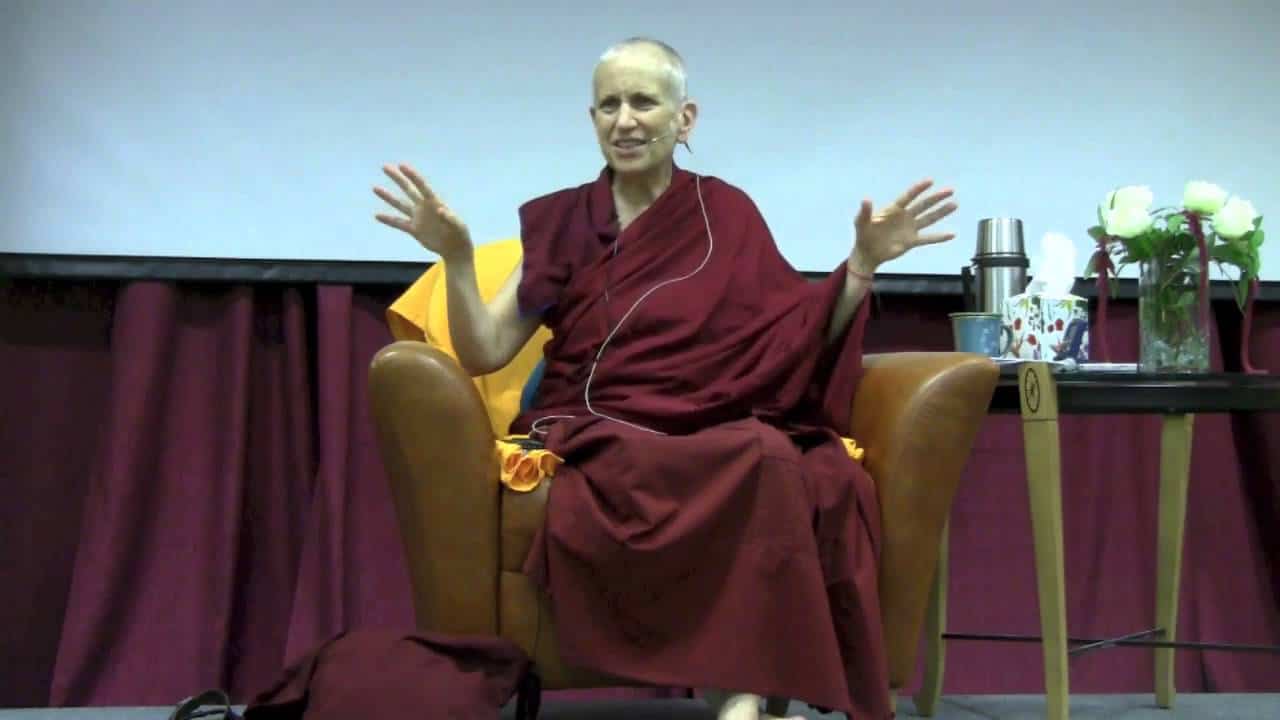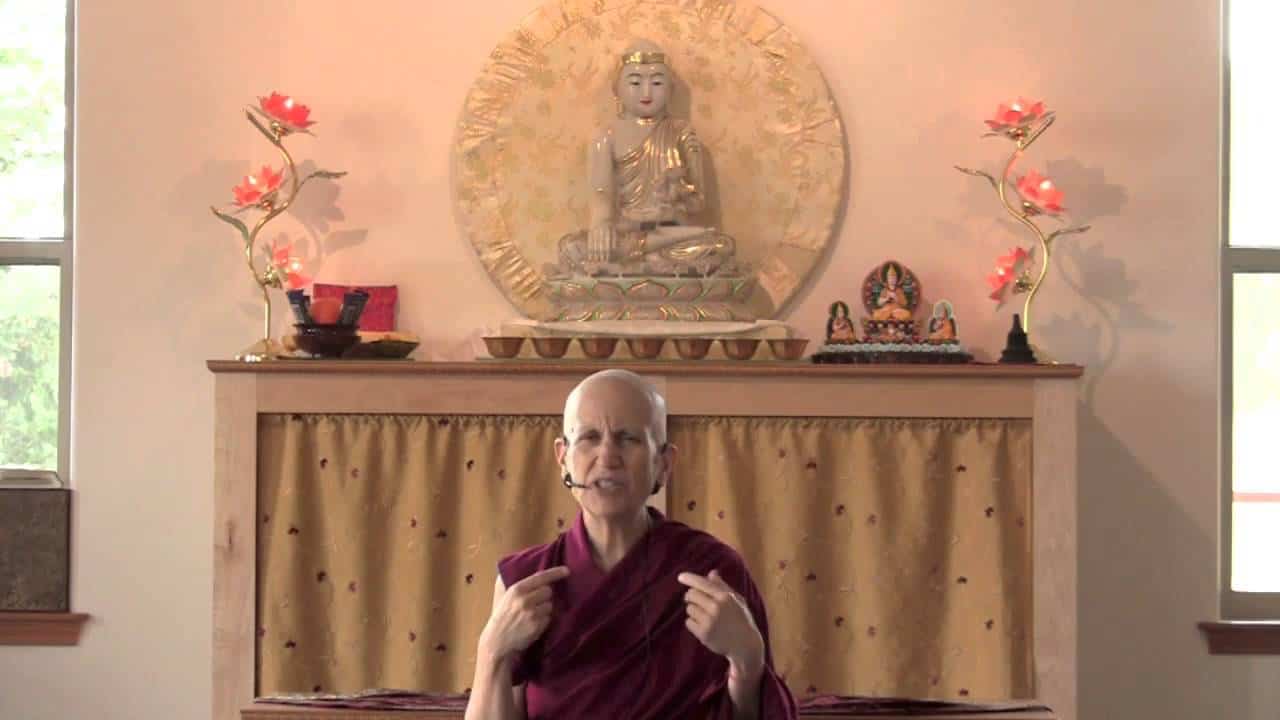Causal and resultant refuge
Part of a series of teachings on the text The Essence of a Human Life: Words of Advice for Lay Practitioners by Je Rinpoche (Lama Tsongkhapa).
- Realizing the danger we’re in and turning to reliable guides
- Understanding that the Dharma is the real refuge
- The analogy of the doctor, the patient (that’s us), the nurses to help us, and the medicine
The Essence of a Human Life: Causal and resultant refuge (download)
Where we are in the text is,
- We’ve thought about our precious human life and its benefits
- The difficulty of getting it
- How it doesn’t last forever, so better not to waste it, because we’re going to die
- At the time we die the only thing we take with us is our karma and our mental habits
Since karma is very powerful, karma will throw us into another life and will also influence what we become, what our habits are, what environment we’re in, what happens to us in our future lives.
Seeing this situation, and realizing the danger in it because when we do some introspection we see that we’ve created a lot of negativities in this life, let alone in previous lives, so many previous lives when we haven’t even met the Dharma, imagine the negativities we’ve created in them, when even this life when we’ve met the Dharma we’ve created so much negativity. Then we become quite concerned and we realize we need some help, we need some guidance, we need support. So then we turn to the Three Jewels of refuge.
The Dharma is the real refuge. The Dharma Jewel is the true cessations and true paths. When we can actualize those in our mind, then our mind is liberated. When our mind becomes the Dharma Jewel, then that’s liberation. We have become the Dharma Jewel. That’s why the Dharma is the real refuge that we turn to, because that’s the one we actualize.
When we actualize the Dharma we become a Sangha member, and then as we practice and purify our mind even more we become the Buddha.
In terms of actualizing the three refuges, first we become the Dharma Jewel, the Sangha Jewel, the Buddha Jewel.
Those are the resultant three refuges. What we need to do in order to actualize those is we need to take refuge first in the causal three refuges, the Buddha, Dharma, and Sangha that at the moment are external to us. Because if we already had realized the Buddha, Dharma, and Sangha inside of us, then we would already be free. So we need to start by taking refuge in the Dharma that is external, the Sangha members, and the Buddha Jewel.
Here the analogy is often given—and I think it’s a very good analogy, and the more we can really get this analogy into our head, the better it helps us—is we’re like a patient, somebody who’s sick. Our disease is samsara. We go to the Buddha, who is like the doctor, and the Buddha gives us a diagnosis and says, “You’re suffering from the first noble truth (true dukkha) and the causes, the “spiritual virus,” that’s causing all of this (true origins) is rooted in the chief “spiritual virus,” which is ignorance. So you need to take the medicine, which is the true path to gain the realizations of the path, specifically the wisdom realizing emptiness, and that will lead you to a state of health, which is true cessations, the cessations of all the dukkha and its causes.
The Buddha diagnoses the illness, prescribes the Dharma as the medicine to take. Being limited beings, we get the prescription and then we get the pills (if we’re lucky), we go to the pharmacy, we get the pills, but we forget how to take them. One blue in the morning, two pink in the afternoon, half a tab of the green one in between…. We need help. The Sangha is like the help, the people who help us take the medicine, who crush it up and mix it with the Abbey’s applesauce, and put it in the spoon and go “open wide,” and helps us take the medicine.
We need all Three Jewels to help us, because otherwise sometimes we don’t…. We’re suffering, but we don’t go to the doctor, we’re too lazy. Or we don’t go to the doctor because we’re actually afraid the doctor is going to tell us we’re sick. Even though we know we’re sick, we don’t really want to know. We want to keep pretending we’re okay, so we don’t even want to go to the doctor. So we don’t go to Dharma class, we don’t ask spiritual questions at all. Sometimes we go, we get the prescription for the medicine, we say, “That’s nice,” stuff it in the bottom of whatever we happen to be carrying, and forget about it. So we go to Dharma class, “Oh that’s very nice,” go home, forget about the Dharma. Don’t practice at all.
Sometimes we keep the prescription with us. We put it on the refrigerator with a magnet on top, but we don’t go fill it. That’s like you went to class, you got the Dharma books, you bring the Dharma books home, but you don’t read them, and you don’t go back to class.
Or sometimes you go and get the medicine, you fill the prescription, and you put it there right on your nightstand, and you don’t take it. Because, “I don’t know, those pills look so pretty, but they probably don’t taste so good. So I’ll just look at them, that’ll make me feel better.” That’s like we have our altar, we have our Dharma books, we have notebooks full of notes. We never read any of them. We never sit down on the cushion. We have all the medicine, but we don’t take it, so we don’t get well.
Then enters the nurse, one of your Dharma friends, who says, “You know, you’re looking worse than you did before.” And we go, “Oh no, I’m feeling fine, everything’s great.” And your friend kind of keeps bugging you and says, “You know, you’re temper’s worse, and everybody sees that,” and finally succeeds in convincing us that we need to take the medicine. And so this kind friend (that is the Sangha), knowing that we don’t even want the applesauce, we’re too good for the medicine crushed in the applesauce, it has to be mixed in chocolate pudding. The Sangha makes the medicine really digestible, mixing it in the chocolate pudding, plays zoom, and then gives us a piece of chocolate cake (like a kitty treat) at the end for taking our medicine. And then we start to get well.
But we’ve got to take that medicine. Otherwise it just doesn’t happen. And the thing is the Buddha, Dharma, and Sangha can help us, but even if they put the medicine in our mouth, we still have to swallow it. Nobody can swallow it for us. We have to do that ourselves. This is where personal responsibility comes in. We’re in a predicament, others help us, but we have the responsibility to do our part. Otherwise, the time of death comes, we’ve been miserable our whole lives, but we have a beautiful altar and tons of Dharma books, and even more notebooks filled with notes, and even computer files with all the theses that Jeffrey sent us, all the books on computer files, PDFs of everything…. Haven’t read any of them, haven’t practiced any of them. We just look at our altar, and we tell our friends, “Look at our beautiful altar. And there’s a picture of me with the guru. Don’t we look good together. And he signed it.” And our little bit kind of puffed up. “He not only signed it, but he dedicated it to me so it has my name on it.” But we’re lying in our bed dying, and what good does that picture do us? Zero. Because what really helps us at the time of death is our practice. So death is the real test of our practice. And since we can’t escape death, we’d better practice.
Venerable Thubten Chodron
Venerable Chodron emphasizes the practical application of Buddha’s teachings in our daily lives and is especially skilled at explaining them in ways easily understood and practiced by Westerners. She is well known for her warm, humorous, and lucid teachings. She was ordained as a Buddhist nun in 1977 by Kyabje Ling Rinpoche in Dharamsala, India, and in 1986 she received bhikshuni (full) ordination in Taiwan. Read her full bio.


